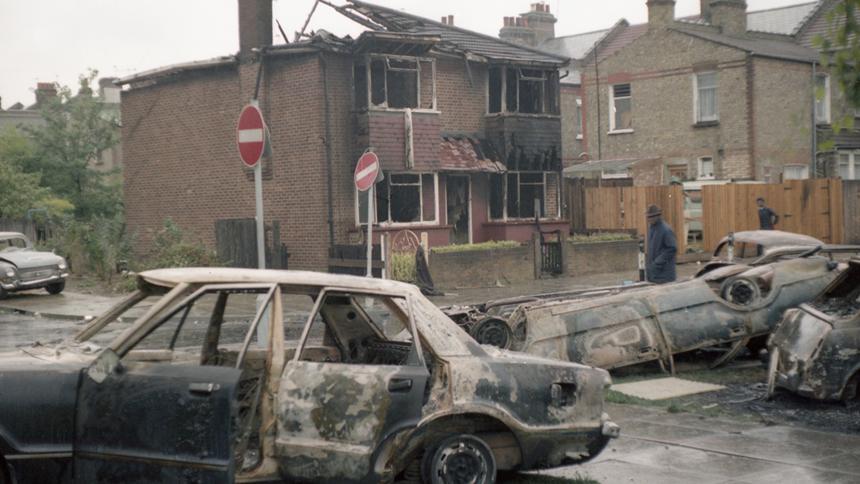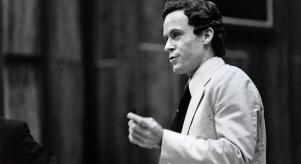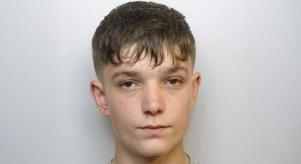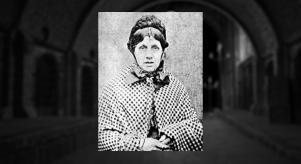
The Broadwater Farm Riots
A black man called Floyd is arrested; a tragically needless death ensues; a racial tinderbox is set alight with long-standing grievances exploding onto the streets. Where and when did all of this happen? Right here in the UK in October 1985, when the Broadwater Farm estate in north London became a place of open warfare, and PC Keith Blakelock was cut down in one of the most brutal and notorious slayings ever seen on Britain’s streets.
The Broadwater Farm estate – a pest-ridden labyrinth of concrete towers and dank, shadowy walkways – had long been an epicentre of crime and deprivation. Tenants, largely made up of minority ethnic groups, applied to transfer to other estates in large numbers, and in 1976 even a government department recommended the whole estate was beyond repair and should be demolished. The general feeling of resentment and disenfranchisement among residents was fed by the fact that, in the early 80s, the Tenants’ Association was entirely made up of white people.
a parable of what 1980s Britain had seemingly become
There were efforts to redevelop and refresh the area, with Princess Diana even paying a visit in early 1985. But it was in October of the very same year that the estate would be plunged into violence so extreme that, in the words of BBC journalist Kurt Barling, Broadwater Farm would be mythologised as 'a parable of what 1980s Britain had seemingly become'.
On 5th October, a week after Brixton had seen riots break out following the police shooting of a black woman named Cherry Groce, a young black man called Floyd Jarrett was arrested in north London. He was charged, groundlessly, with theft and assault. Though he would be acquitted, a group of officers took it upon themselves to search the home of his mother, Cynthia Jarrett, near the Broadwater Farm estate. As the police rooted through her home, Cynthia Jarrett suffered a heart attack and died. It was later alleged she had been shoved by one of the officers.
Within hours, local residents were staging an angry demonstration outside Tottenham police station. Despite calls for calm from community leaders, the situation escalated rapidly by the evening of 6 October. On the estate, hundreds of young black men threw bricks and petrol bombs at riot police. Cars and buildings were set alight. Amid the hellish carnage, a group of firefighters were dispatched to tackle a reported fire in one of the estate’s blocks.
They were accompanied up a stairwell by a unit of police officers, including PC Keith Blakelock. During the ascent, they were suddenly faced with dozens of masked rioters. In the words of Sgt David Pengelly, who later testified in court, it was an 'absolutely terrifying scenario… As we retreated down the stairway there were people with iron bars and at least one with a machete effectively trying to chop the shields to bits. The retreat to ground level was just a continuing nightmare.'
As the firefighters and officers desperately fled the scene, Blakelock tripped and fell. Immediately, the crowd set upon him with knives and machetes. He was kicked, stabbed and hacked at numerous times, while his colleague PC Richard Coombes was left with life-altering injuries.
Controversy raged in the aftermath of the savage murder. Labour councillor Bernie Grant was slammed for seeming to lay the blame with the authorities, saying 'the youths around here believe the police were to blame for what happened on Sunday and what they got was a bloody good hiding.' Meanwhile, the Commissioner of the Met Police, Kenneth Newman, suggested that far-left agitators and anarchists were behind the riots (allegations that right-wing pundits continue to make against Antifa and Black Lives Matter campaigners today).
The quest to track down Blakelock’s killers became one of the largest investigations in the history of the Metropolitan Police. Hundreds of young locals were arrested, many held for days without the intervention of lawyers. The climate of fear and distrust in the community intensified. Eventually, three men called Winston Silcott, Mark Braithwaite and Engin Raghip were convicted and sentenced to life terms. Silcott was given particular media scrutiny, depicted – as Silcott himself later said – as a 'big black man to be fearful of'.
All three had their convictions overturned in 1991. This turn of events was accompanied by fresh controversy when Silcott was awarded a pay out of £50,000 for false imprisonment and malicious prosecution. Keith Blakelock’s widow described it as 'upsetting and insulting', while Richard Coombs, horrifically injured that same night, said he was 'devastated'.
Many years later, in 2014, another man – Nicky Jacobs – was acquitted of murdering Blakelock following a multi-million pound investigation. One piece of evidence against him was a set of rap lyrics he’d written while serving time for affray, which contained the words 'Me have de chopper, we have intention to kill a police officer, PC Blakelock de unlucky'. Jacobs’ defence barrister retorted by pointing out, 'Bob Marley wrote "I Shot the Sheriff" but I have not heard of him being put on trial for murder.'
An eyewitness who identified Jacobs was also discredited when it transpired he’d once said in a police interview that he couldn’t tell black people apart. 'I’m not a racist person but to me a black is a black, all right?' he said. 'I can’t tell the difference between them.'
Jacobs was found not guilty. The murder of PC Blakelock remains an agonising enigma for Blakelock’s family and colleagues, while the Broadwater Farm riot has taken on totemic significance in the history of multicultural Britain. It was regarded as searingly relevant again in 2011, when mass riots broke out following the police shooting of Mark Duggan, a black north Londoner who’d been brought up in Broadwater Farm.
These riots were, to many, a startling reminder that ongoing tensions between the black community and police were still raw and real, despite the widespread complacency of the new millennium. And the more recent Black Lives Matter protests have cast the most glaring light yet on the everyday reality of anti-black racism in Britain, all these decades on from that infernal night in October 1985.
Top Image: Broadwater Farm riot: the next day: CC BY-SA 4.0




